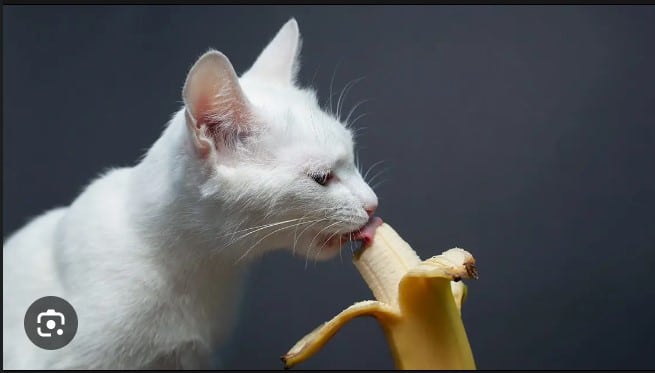Bananas are a healthy and easy-to-eat snack for people, but they might not be suitable for your pets. If you have a cat, you might be curious about whether it’s okay for them to eat bananas. Don’t worry! In this article, we address the big question: “Can Cats Eat Bananas?” We also talked about Understanding Banana as a Diet and How much Banana can a Cat Eat?. As well as Benefits of Feeding Bananas to Cats and Potential Risks and Considerations.
The web is full of cute videos showing cats tasting different foods, including bananas. But cat owners often wonder if it’s okay for their feline friends to eat bananas. Since cats mainly eat meat, we’ll discuss if bananas are safe, what nutrients they offer, and any possible good or bad effects on cats.
Are Bananas good for cats?
Bananas are full of good stuff like fiber, magnesium, potassium, and vitamin C, making them a healthy snack for people. However, when it comes to cats, they can get all the nutrients they need from specially-made cat food. Cats usually don’t care much for sweet foods like bananas. If your cat happens to like them, it’s okay as an occasional treat, but don’t overdo it because of their sugar content. Stick to cat food for their main nutrition.
See also: Can Cats Eat Cherries?
Understanding Banana as a Diet
Before we talk about whether cats can eat bananas, it’s important to understand what cats need in their diet. Unlike animals that eat both plants and meat or just plants, cats are obligate carnivores. This means they depend on proteins from animals for essential nutrients like taurine, arachidonic acid, and vitamin A.
Cats don’t have the digestive enzymes needed to efficiently process nutrients from plants. While they might nibble on grass sometimes for digestion or to make themselves throw up, their bodies aren’t really designed to get nutrients from fruits and veggies.

Can Cats Eat Bananas?
Yes, cats can eat bananas, but it’s important to be cautious. Bananas are safe for cats and can offer some nutritional benefits like potassium, vitamin C, and fiber, which are good for their health.
However, not all cats may like bananas, and those with health issues like diabetes or obesity should avoid them due to the sugar content. Cats should only eat the banana itself, not the peel, as the peel can be hard for them to digest and might cause stomach problems or blockages.
Even though bananas are generally safe, some cats may not react well to new foods. They could experience vomiting or diarrhea, especially with sugary or starchy foods like bananas. It’s crucial to observe your cat’s response and introduce new foods slowly to keep their digestive system healthy.
See also: Is Lemongrass Safe for Cats?
How much Banana can a Cat Eat?
In general, treats should make up no more than 10 percent of a cat’s daily calorie intake. This is due to the fact that bananas have quite a few calories. To keep things balanced, it’s a good idea to offer your cat a small piece of banana, like a 1-inch square, every few weeks.
When you treat your cat with a banana, it’s smart to cut down on other treats that are high in carbohydrates. This helps keep your cat’s diet in check and prevents too many calories. Always check with a vet to make sure bananas are okay for your cat. Also, get advice on the right amount to give them to avoid any negative effects on their health.

Benefits of Feeding Bananas to Cats
Even though cats don’t need fruits, some owners give them a bit of banana as a special treat. Doing so can have a few potential benefits for cats:
Potassium Boost
Bananas have potassium, which is important for a cat’s heart and muscle function. In small amounts, it can contribute to their overall health. This nutrient is important for keeping your cat’s heart and kidneys healthy. It becomes especially crucial for senior cats, as older cats may have a weaker heart and might face issues like chronic renal failure.
Providing your cat with the right amount of potassium is like finding a balance. A good cat food should already have the correct mix of vitamins and minerals your cat needs. Normally, potassium intake should be around 0.6% of your cat’s daily diet. If you think your cat needs more potassium, it’s best to consult your vet for advice.
Low blood potassium, known as hypokalemia, can be a problem. It might not show noticeable signs in mild cases, but it can lead to kidney failure. Your cat might eat less, and their limbs may become weak or stiff. Occasionally giving bananas in the right amount could help, but always check with your vet before making any changes to their diet.
See also: Can Cats Eat Coconut?
Digestive Aid
The fiber in bananas might help with digestion and prevent constipation. But it’s worth noting that cats usually get enough fiber from their meat-based diet.

Mental Stimulation
Introducing new and safe foods, like a small piece of banana, can mentally stimulate and enrich a cat’s environment. It can be a fun and engaging experience for your furry friend.
Vitamin B6
Bananas have Vitamin B6, which is good for older cats. This vitamin is crucial for kidney function but gets removed in their urine throughout the day, so it needs to be replaced.
However, don’t depend solely on bananas for Vitamin B6, as your cat would need to eat a lot to get enough. But if your cat likes the taste, a bit of banana here and there can be a nice supplement.
Manganese
Bananas also have a little bit of manganese, a trace element. Manganese is good for the skin as it helps make collagen. This is important for senior cats because older cats can have weak skin and may suffer from scabs and sores.
Cats only need a small amount of manganese each day, and deficiencies are rare. Adding a small slice of banana to your cat’s diet won’t hurt and can give them a bit more manganese.
See also: Are Monstera Toxic to Cats?
Potential Risks and Considerations
Even though bananas can have some good points, it’s important to know about the potential risks when giving them to cats:
High Sugar
Bananas have natural sugars, and too much sugar can lead to obesity and other health problems in cats, even though a small amount might be okay.
Upset Stomach
Some cats might not feel well after eating bananas, showing signs like vomiting, diarrhea, or stomach discomfort. If you see any of these reactions, it’s best to stop giving bananas.

Allergies
Cats can have allergies to certain foods, just like people. If your cat is trying bananas for the first time, watch for signs of an allergic reaction, like itching, swelling, or trouble breathing.
Obesity Concerns
While bananas themselves aren’t high in calories, giving too many treats can make a cat overweight. Keeping their diet balanced is important to avoid weight-related health problems.
See also: Is Bamboo Toxic to Cats?
Fiber
Fiber helps the digestive system work well and helps in passing healthy waste. Bananas have a lot of fiber, making them seem like a good treat for cats. However, it’s easy for a cat to eat too much.
If your cat already eats a good, balanced diet, it gets enough fiber. But giving too much can upset their digestion, leading to issues like diarrhea and dehydration if not taken care of.
Cats take a long time to process fiber. On the positive side, it makes them feel full for a while, so they won’t ask for more food or treats. But on the downside, it slows down digestion and can make your cat feel bloated.
Carbohydrates
Carbs are a major food group, but unlike humans, cats don’t really need them. If a cat eats too many carbs, they get extra calories that might lead to obesity if not burned off.
How to Safely Feed your Cat Bananas
If you want to share a bit of banana with your cat, follow these simple tips for a safe and enjoyable experience:
Start Small
Give your cat a tiny piece of banana at first to see if they like it and to check for any negative reactions.
See also: Are Carnations Toxic To Cats?

Peel it
Cats might have trouble digesting banana peels, so be sure to remove the peel before giving it to your cat.
Watch for Reactions
Keep a close eye on your cat after giving them bananas. Check for signs of upset stomach, allergies, or any other problems.
Moderation is Important
Don’t give your cat too much banana to avoid too much sugar and potential health issues.
Ask Your Vet
Before adding any new food to your cat’s diet, it’s smart to talk to your vet. They can give personalized advice based on your cat’s health and dietary needs.
See also: Are Pothos Toxic to Cats?
Conclusion
In summary, cats can have bananas as a treat now and then, and there might be some good things about it. But it’s important to know that bananas shouldn’t replace their regular, meat-focused meals. While bananas won’t harm them, be aware of possible issues like upset stomach or allergies. Like with any diet changes, talking to a vet is a good idea to make sure your cat stays healthy. Taking a careful and balanced approach to giving your cat bananas can make it a safe and enjoyable experience for both you and your furry friend.
See also: https://outwardhound.com/furtropolis/cats/can-cats-eat-apples

